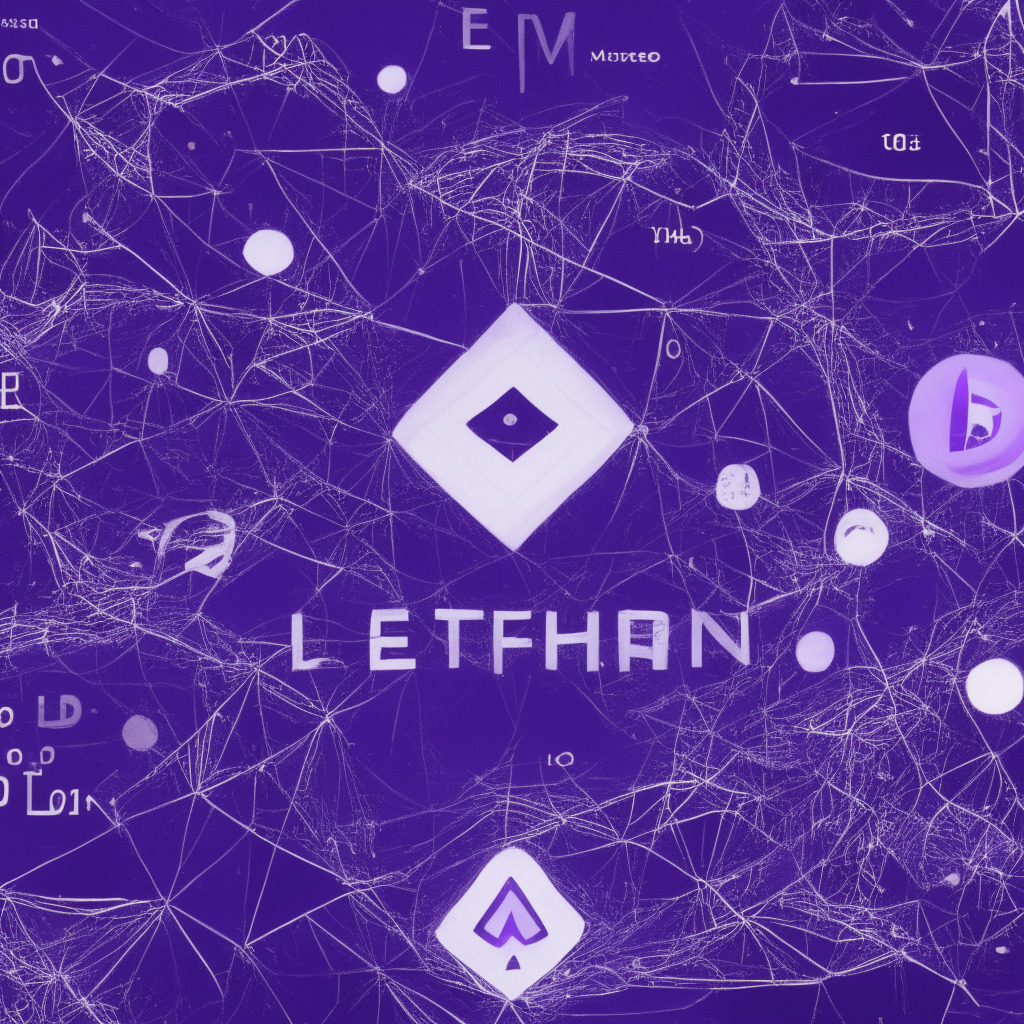This article highlights the potential risks and consequences associated with Ethereum’s reliance on Amazon Web Services (AWS) for hosting, as a recent AWS outage raises questions about the fragility of such dependence. It emphasizes the importance of developing decentralized technologies and infrastructures for creating more resilient networks.
Search Results for: staked ether
Ethereum’s Future: $51B Revenue Projection and $11.8k Price Target by 2030
VanEck revisited its Ethereum estimates using a robust valuation model, predicting Ethereum’s annual revenue to rise from $2.6 billion to $51 billion by 2030. The Base Case scenario reveals a potential 2030 price target of $11,848 per ETH token. Ethereum’s current dominance in key sectors and its potential as a store-of-value asset support these bullish projections.
Ethereum Co-Founder’s Massive $41M ETH Sale: Impact on Price and Market Speculation
Ethereum co-founder Jeffrey Wilcke transferred 22,000 ETH ($41.13 million) to Kraken, fueling speculation of a significant ETH price drop. This follows previous large-scale ETH sales by the Ethereum Foundation and co-founder Vitalik Buterin, creating uncertainty in the crypto community.
Celsius Network’s ETH Staking Strategy Lengthens Queue for New Ethereum Validators
Celsius Network’s recent changes to its ETH staking strategy have exacerbated the already long queue for activating new validators on the Ethereum network. The company’s transfers have stretched the queue for establishing new validators now to 44 days, potentially adding almost an additional week due to Celsius actions.
Ethereum Liquid Staking Derivatives: Reviving DeFi or Introducing New Risks?
DeFi-focused Ethereum liquid staking derivatives (LSD) platforms show potential for reviving Ethereum’s network activity. With gas consumption dropping in DeFi protocols, LSDfi leverages LSD token liquidity in DeFi applications for higher yields, despite potential smart contract risks.
Ethereum Staking Surge Post-Shanghai Upgrade: Impact on Token Supply and Price Predictions
Ethereum staking deposits surged to an all-time high of 24.17 million ETH ($46.03 billion) post-Shanghai upgrade, leading to a sharp reduction in the overall supply of Ethereum tokens. The rise in ETH locked and increased staking is pulling tokens out of circulation, potentially putting upward pressure on Ethereum’s price and making it more attractive to institutional investors.
Bankrupt Crypto Lender’s $800M ETH Staking Move: Impact on Ethereum Validator Queue & Market Safety
Crypto lender Celsius Network’s $800 million Ether staking move has caused significant delays in the Ethereum validator queue, stretching it to 44 days. Following Ethereum’s Shanghai upgrade, Celsius reshuffled staked ETH holdings, potentially adding nearly a week of delay. This highlights the need for a more scalable and accessible network as Ethereum 2.0 transitions to proof-of-stake.
Celsius Network’s ETH Staking Strategy: Impact on Validators and Ethereum’s Ecosystem
Celsius Network significantly alters its ETH staking strategy, causing an increased congestion in Ethereum’s validator activation queue. This move involves moving $745 million worth of ETH into staking contracts after redeeming $813 million from Lido Finance, impacting Ethereum’s ecosystem and adding pressure on the network.
Ethereum Staking Skyrockets: Impact of US Debt Ceiling and High APR on ETH Popularity
The record surge in Ethereum staking in May, reaching an all-time high of 2.96 million ETH, was attributed to factors such as the US debt ceiling saga, declining confidence in the U.S. dollar, banking crises, and high annual percentage rates (APR) offered on ETH staking.
Evaluating Origin Ether: Rapid Growth vs Sustainability in Yield Farming
Origin Ether (OETH), a new yield farming app, has rapidly gained over $12 million in total value locked (TVL) in just 14 days. Utilizing liquid staking and DeFi protocols, OETH allows users to earn rewards from multiple sources. However, potential investors should cautiously evaluate its long-term sustainability due to the speed of its expansion.
Ethereum Exodus from Centralized Exchanges: Bullish Sign or Cause for Concern?
Ethereum (ETH) held on centralized exchanges hits a near five-year low, with only 17.8 million ETH, representing 14.85% of the total token supply. This decline follows the collapse of the FTX exchange, increased staking, and a trend towards decentralization, but potential risks must be considered.
Ethereum Exchange Supply Plummets: DeFi, FTX Crisis, and Shapella’s Influence
Ethereum’s exchange supply hits a 5-year low, with only 14.85% held by centralized exchanges, due to factors like the FTX crisis and the Shapella upgrade. This migration away from exchanges is considered bullish, as re-staking reinforces faith in Ethereum’s long-term growth and value stability.
Ethereum Exchange Reserves Hit 5-Year Low: Bullish Momentum or Decreased Interest?
Ethereum balance on crypto exchanges hits five-year low as investors anticipate price increase. Low exchange reserves indicate bullish momentum, but decreased volatility and trading volumes post-Shanghai upgrade warrant cautious approach in investment decisions.
Ethereum Price Gains as Staking Trend Grows: Will ETH Hit $3,000 by Year-End?
Ethereum’s price gains follow the enabling of ETH staking withdrawals on the Lido platform. Despite net outflows, a massive sell-off hasn’t occurred, and staking trends put ETH in a favorable future position. EcoTerra and AiDoge, alongside Ethereum, are promising altcoins with market-shaping potential.
Surge in Ether Staking Interest: Passive Income Opportunities & Shapella Upgrade Effects
The Shapella upgrade has spurred interest in Ethereum staking, with 22.58 million coins now deposited, as investors seek passive income and withdrawal flexibility. Although staking hasn’t triggered a sustained Ether bull run, the growing demand suggests confidence in this investment strategy and a potentially promising outlook.
Ethereum Staking Provider Lido Proposes LDO Token Utility Boost: Analyzing Impact and Risks
Ethereum staking solution provider Lido has proposed a staking mechanism for its native LDO token to enhance utility and financial sustainability. The program would allow token holders to stake LDO for a share of Lido’s future earnings, with rewards paid out weekly but subjected to a 6-month vesting period. The proposal also introduces a new minimum limit for Lido’s insurance fund.
Ethereum Consensus: Balancing Validator Roles and Security Risks Beyond the Merge
Ethereum co-founder Vitalik Buterin cautioned against extending Ethereum’s consensus beyond essential functions like validating blocks and securing the network. He highlighted that expanding consensus “duties” increases costs, complexities, and risks, potentially exposing the ecosystem to security vulnerabilities or 51% attacks. Buterin advocated for a minimalistic approach and assisting developers in finding alternative security methods.
DeFi Turbulence: DOJ Pursues Hackers, Lawsuits, and Ethereum Un-Staking
The DOJ’s crypto czar, Eun Young Choi, highlights the prominence of chain bridges thefts and hacks involving DeFi, emphasizing North Korean state-sponsored hackers’ significant role in exploits. Meanwhile, Ethereum un-staking commenced on the Beacon Chain and Coinbase Cloud joined forces with Chainlink Oracle network to improve smart contract reliability.
Ethereum’s Gradual Rise vs. Alternate Crypto Investments: Analyzing Market Prospects
Ethereum’s price experiences minor fluctuations, but its long-term trajectory appears promising due to strong fundamentals and increased adoption. ETH’s recent growth and potential recovery suggest gradual gains in the market. Major institutions are trialing Ethereum-based applications, contributing to its increasing demand and price potential.
US Debt Default Fears, Ethereum Staking Redemptions, and Crypto Regulation Uncertainty
The cryptocurrency market faces a downturn amidst growing concerns over the US potentially defaulting on debt and regulatory uncertainty in the sector. Alongside these factors, massive Ethereum staking redemptions and a correlation with the volatile US stock market have impacted the market.
Ethereum Staking Surge Post-Shanghai Upgrade: Supply Deflation and Price Implications
After Ethereum’s Shanghai upgrade allowed validators to withdraw staked Ether, demand for ETH staking surged, increasing staking participation from 15% to 18%. With 21.652 million ETH tokens staked and supply deflation, unstaked ETH could become scarcer, impacting price.
Boosting Rewards with Origin Ether: The Future of Yield-Farming in a Crowded DeFi Market
Origin Protocol plans to issue Origin Ether (OETH), an ether derivative enabling holders to earn yields by staking ether on other protocols, stacking rewards on top of native staking yields. OETH offers access to DeFi’s highest yields without typical yield-farming hassles and gas fees. However, the crowded staking derivatives market presents challenges for OETH’s growth.
Ethereum Price Dips and Lido Withdrawals: Analyzing the Impact on Blockchain’s Future
Ethereum price dips 0.5% in 24 hours as Lido rolls out withdrawals on its ETH staking platform. Despite the decline, technical indicators suggest a breakout rally. Increased adoption and ETH staking withdrawal availability could drive prices upwards.
Ether Yields vs Traditional Investments: Navigating the Changing Financial Landscape
Ether (ETH) yields are emerging as an attractive alternative to zero-yield bank deposits. As Ethereum activity experiences increased adoption, the demand for ETH deposits and yields may reshape the crypto landscape, creating tension between traditional investments and emerging crypto yield opportunities.
Lido V2 Upgrade: Pros, Cons, and Impact on Ethereum Staking and Crypto Market Volatility
The Lido V2 upgrade on Ethereum mainnet enables staked Ethereum withdrawals and enhances Ethereum staking experience. However, concerns arise about the impact of these withdrawals on crypto market volatility. Users should remain cautious and conduct thorough market research before investing.
Ethereum Validators Face 26-Day Wait Time: Implications for Staking and Network Growth
Crypto investors face a waiting time of nearly a month to become network validators on Ethereum, with 640 hours required for setup. Almost 50,000 validators are in the queue, attracted by the nearly 5% annual yield. The lengthy waiting times highlight the strong interest in participating in the Ethereum network, but need to be addressed to maintain a seamless user experience.
Ethereum’s Double Troubles: Resilience vs. Reliability Debate in Blockchain’s Future
The Ethereum network recently faced two performance issues within 24 hours that temporarily halted block finalization. Though the network recovered, concerns about its reliability resurface, potentially affecting market confidence and Ethereum’s role in the $27 billion total value locked across various financial infrastructures and applications.
EigenLayer: The Future of Blockchain Security or Overhyped Ethereum Competitor?
EigenLayer protocol aims to provide blockchain security-as-a-service, enabling secure crypto project launches without extensive funds, hardware, or validators. By “rehypothecating” staked ETH, it increases yield for stakers and incentivizes participation, while attracting praise and financial support from prominent investors. The project’s success, however, remains to be seen.
Ethereum Clients Prysm & Teku Fix Finality Issues: Analyzing Pros, Cons & Network Resilience
Ethereum consensus clients Prysm and Teku have released updates to address Beacon Chain finality issues. Although these issues did not impact end users and transactions, they raised concerns for stakers and developers. Client diversity remains crucial in maintaining network resilience during partial failures.
Ethereum Finality Hiccups: Analyzing Reactions, Implications, and Future Impacts
The Ethereum network recently faced two instances of technical issues causing confusion and debate among users and developers. These finality issues have raised concerns within the Ethereum community, emphasizing the importance of understanding blockchain technology and safety measures in the cryptocurrency world.
Lido V2 Upgrade: Anticipating Benefits, Risks, and Impact on Ethereum Staking Demand
The upcoming Lido V2 upgrade, contingent upon an on-chain vote, will introduce benefits such as withdrawals for ETH and a staking router simplifying the crypto on-ramp for users. Offering streamlined validator exits and withdrawal requests fulfillment, the upgrade seeks to enhance users’ staking experience while addressing issues related to security and efficiency.
Ethereum’s Informal Supply Cap: Aligning with Vitalik’s Vision and Impacting Market Dynamics
Ethereum’s ether supply has an informal cap due to ongoing token burns, brought closer to reality by EIP-1559’s fee-burning mechanism and the shift to a proof-of-stake consensus. With supply deflation for five consecutive months, ether’s inflation rate has fallen, currently standing below Bitcoin’s. This development strengthens the once-dismissed idea of an ether supply cap but is not an official hard cap.































